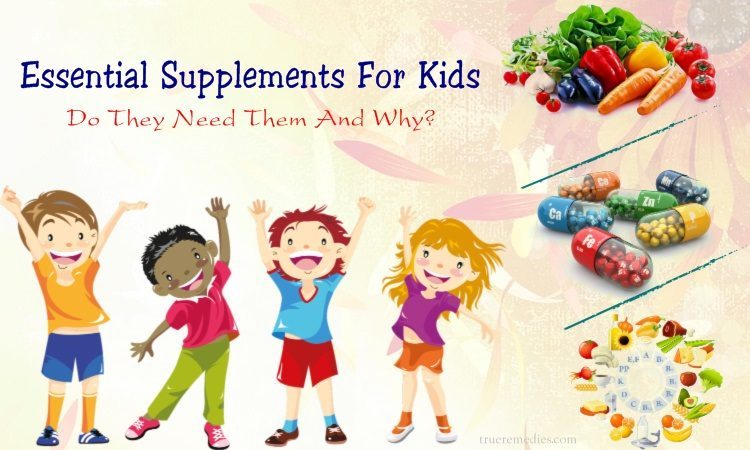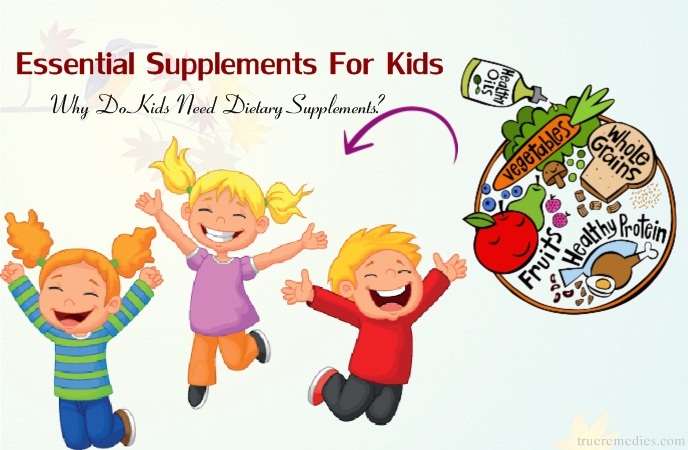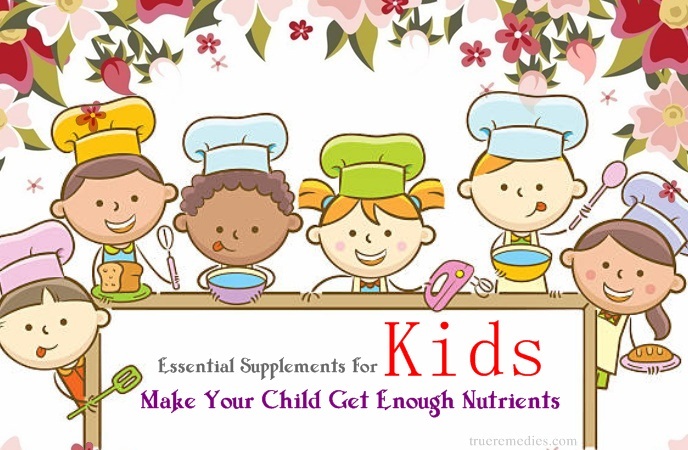Contents
We all know that minerals and vitamins, as well as other essential nutrients, play important roles in children’s growth and development. They give children the optimal health, immunity, and maximum mental and physical development.
Many parents may wonder whether kids need dietary supplements after seeing a lot of products that are claimed to be good for children’s health and intelligence. Some people argued that children require less amount of every essential mineral and vitamin than adults and they can get adequate amounts from a healthy balanced diet. That is true but not all. Under some circumstances, it is important for parents to give their children the supplement with minerals and vitamins. In this article, True Remedies is going to tell you the need-to-know things about dietary supplements for kids and whether your kid needs these supplements.
- 29 good social manners for parents to teach their kids
- 11 ways how to protect babies from mosquito bites naturally
Essential Supplements For Kids: Do They Need Them And Why?
I. Nutrients Needs For Kids
The nutrient needs for kids vary, depending on their sex, age, activity level, and growth. According to nutritionists and health experts, young children aging from two to eight need 1,000 – 1,400 calories daily while those between nine and thirteen require 1,400 – 2,600 calories a day.
To ensure the optimal growth and development of a child, the intake of some minerals and vitamins is indispensable but the amount of each one is not the same. Here are the essential nutrients for kid’s growth and its recommended daily intake, according to health experts.
| Nutrients | Benefits for kids | For 1-3-year-old kids | For 4-8-year-old kids |
| Iron | Boost the production of red blood cells, prevent anemia | 7 mg | 10 mg |
| Calcium | Support the growth of teeth and bones, enhance muscle function and nervous system | 700 mg | 1,000 mg |
| Vitamin A | Support the development of tissues, teeth, and bones; develop good vision; boost the growth of skin cells | 300 mcg | 400 mcg |
| Vitamin B12 | Boost the production of red blood cells, maintain the healthy nervous system | 0.9 mcg | 1.2 mcg |
| Vitamin C | Keep teeth, gums, bones, and blood vessels strong; boost the immune system; fight against infection | 15 mg | 25 mg |
| Vitamin D | Strengthen bones; boost the healthy immune system; prevent infection and early arthritis | 15 mcg | 15 mcg |
Besides, kids also need DHA, a type of omega-3 fatty acid that is good for the optimal development and growth of the eyes and brain. Children taking enough amounts of DHA in their diet will do less aggressive activities. The DHA recommended daily intake varies from children to children. Therefore, you should consult the experts to know the ideal amounts for your child’s optimal health. Besides, vitamin K, vitamin F, magnesium, and zinc are also important for the development and growth of a child.
Overall, children have the same nutrient needs as adults but they require smaller amounts only. These nutrients play important roles in the full growth of children. For example, they build strong bones, boost brain development, and maintain healthy eyesight; etc.
TrueRemedies Partner Solutions

Need a Help from the Leading Expert Online, Available 24/7?
They’re all here and ready to answer your questions online or by phone. Keep asking questions until you get the answer you need.
II. Why Do Kids Need Dietary Supplements?
The question of whether kids need dietary supplements depends on each situation. If your children eat a balanced and healthy diet, there is no need for them to take nutrient supplements. According to the United States Department of Agriculture Dietary Guidelines for Americans and the American Academy of Pediatrics, taking dietary supplements is not highly recommended for healthy children older than one-year-old who have a healthy balanced diet. This is because kids can get adequate nutrients through a diet full of vegetables, fruits, dairy, grains, and protein. However, there are still some exceptions.
Infants need certain supplements like vitamin D for breastfed babies. The kids who suffer from the deficiencies or are likely to get nutrient deficiencies require certain minerals and vitamins supplements to ensure their optimal health.
Furthermore, dietary supplements are important for kids in those situations:
- Children have a vegan diet.
- Children suffer from a condition which affects the absorption of nutrients such as cancer, celiac disease, inflammatory bowel diseases, cystic fibrosis, or celiac disease.
- Children experience a surgery related to the stomach or intestines.
- Children are picky eaters and those eat less a variety of foods.
Children who go on a vegan diet are likely to get the deficiencies in iron, calcium, vitamin B12, Vitamin D and zinc that are in the animal products.
If your kids do not consume adequate from their diet, they may get serious consequences such as development delays and abnormal growth.
Children who suffer from inflammatory bowel diseases and celiac disease may not absorb the adequate minerals and vitamins like zinc, iron and vitamin D. On the other hand, children with trouble absorbing fat and cystic fibrosis are likely to experience the deficiencies in the fat-soluble vitamins K, E, D, and A.
Children diagnosed with cancer have to increase nutrient intake to prevent malnutrition and related diseases.
Picky children need to take zinc and iron supplements because there is a relationship between picky eating and low intakes of zinc and iron, according to a study.
III. Tips & Precautions On Using Essential Supplements For Kids
You have known when to take important supplements for kids. But it is still recommended to discuss and seek advice with a healthcare provider or nutritionist before giving these essential supplements to your child.
This is because taking a larger amount of minerals and vitamins than the recommended daily amount is dangerous and toxic, causing symptoms of headaches, nausea, or diarrhea. Vitamin D can be toxic if your child takes too much of a supplement. Vitamin A is easy to overeat, leading to vitamin A toxicity.
Some parents may think of letting their children take a multivitamin supplement that contains all the essential minerals and vitamins. That is okay if you follow the instructions of the healthcare provider.
Do not take more than what is in the label directions unless a health care provider gave you different pieces of advice and instructions.
Dietary supplements are taken as the swallow pills for children while kids prefer the chewable gummies or tablets as they usually contain some sweetener. The colors and flavors of these supplements may be artificial or natural. So make sure you read the listed ingredients before buying these essential supplements for kids.
Furthermore, to prevent the side effects and risks, you should find the best supplements from quality brands that are tested by the third party such as United States Pharmacopeia (USP), NSF International, Informed-Choice, ConsumerLab.com, or the Banned Substances Control Group (BSCG).
It is necessary for you to place the supplements out of the reach of children. Taking a mineral or vitamin supplement unsupervised, thousands of children have to be taken to the hospital each year.
When your child has the signs of overeating mineral or vitamin supplements, you need to immediately contact a healthcare provider.
IV. Make Your Child Get Enough Nutrients
Except for certain circumstances, it is better to make your children get adequate amounts of nutrients from their diet full of nutritious foods.
Adding vegetables, fruits, lean proteins, whole grains, dairy products, and healthy fats into snacks and meals can provide your children with enough minerals and vitamins.
Children often eat what they like. Therefore, you can make them eat more by cooking fruits and veggies in different and delicious ways.
Kids should consume less highly processed foods and added sugars. Furthermore, they should eat whole fruits rather than fruit juice.
If you feel your children are not consuming proper or enough nutrition through their diet, you can give them supplements as an effective and safe method.
Do not forget to ask the advice from your child’s pediatrician to ensure the right nutritional intake.
Under the circumstances, taking supplements is needed to ensure the adequate amount of nutritional intake. For safety, you should ask your healthcare provider. We hope that this article in Parenting give you useful information and advice. Any questions can be left in the comment section and we will answer them as soon as we can.
Reference links
- https://www.healthline.com/nutrition/vitamins-for-kids#The-bottom-line
- https://www.eatright.org/food/vitamins-and-supplements/dietary-supplements/does-my-child-need-a-supplement











